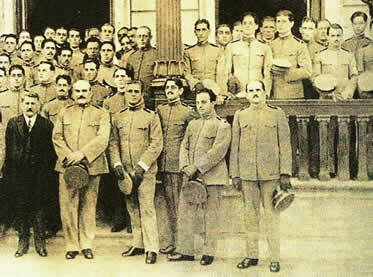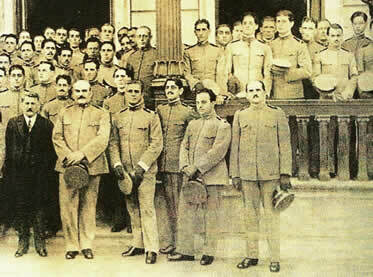The competitive capitalism of the nineteenth century motivated the conflict between different European powers. The interest in expanding markets and domination over regions of imperialist interest made Europe a real powder keg. France wanted to reconquer the region of Alsace-Lorraine lost to Germany. Balkan nationalist groups were displeased with the domination exerted by Austria and Russia. At the same time, diplomatic tensions between Germany and England over the dominance of Afro-Asian regions worsened this situation.
In this way, frustration over the avenues of diplomatic negotiation fueled a major arms race among European nations. The incentive to purchase and manufacture arms further aggravated economic disputes, as large expenditures in the arms sector increased the demand for profits and raw materials. Amidst so much animosity, two conferences still tried to make peace between the powers. In 1898 and 1907, the city of The Hague was the place where they still tried to veto a possible war.
During this period, the disputes also strengthened the creation of military cooperation agreements between some European nations. At the St. Petersburg Convention in 1873, Russians and Germans promised mutual cooperation in the event of military aggression. Soon after, the Austrians and Italians approached these two countries. In this way, Germany, Austria, Russia and Italy seemed to form an opposition group against their possible economic and military enemies.
Another field of dispute was concentrated in the Balkan region. The oppressive dominance of the Turks in the region was seen as a great opportunity where, through armed conflict, the industrialist nations of Europe could expand their businesses. That's when in 1877, Russia, with the support of Austria, decided to declare war against the Turkish Empire. After defeating the Turks, the Russians regained former lost territories in the Balkan Peninsula and Austria gained control over Bosnia and Herzegovina.
Russian hegemony in the region reorganized the alliances previously signed. In 1879, Germany secretly allied with Austria in the event of a Russian invasion which, in turn, would be free to participate in a possible conflict between France and Germany. In the year 1882, the Treaty of the Triple Alliance signed a military cooperation agreement bringing together Germany, Austria and Italy. All these maneuvers signaled that the world seemed to be “too small” compared to so many nations eager to establish their economic supremacy at any cost.
At the end of the 19th century, the former English industrial hegemony began to be threatened. The Germans managed in a short period to form an industrial park that began to surpass the traditional British industrial solidity. Feeling threatened, the British left their political-geographical isolation to sign agreements with France. After resolving their disputes, France and England signed the Entente Cordial in 1904. Later, Russia also approached the British and French. From that, the Triple Entente was formed.
In this way, Europe was politically divided between the two great agreements signed at the time. The Triple Entente and the Triple Alliance profiled the rivalry in a very troubled scenario. The mobilization of powers in blocs prepared a good part of the conditions necessary for the conflicts of the First World War to occur.
Do not stop now... There's more after the advertising ;)
Would you like to reference this text in a school or academic work? Look:
SOUSA, Rainer Gonçalves. "Background of the First World War"; Brazil School. Available in: https://brasilescola.uol.com.br/guerras/antecedentes-primeira-guerra-mundial.htm. Accessed on June 28, 2021.
wars

Brazil in World War I, World War I conflicts, Triple Entente, cargo ships, German submarines, Spanish flu, Treaty of Versailles, indemnification.
wars
World War I, Great War, Battle of the Marne, War of Movement, War of Position, Trench War, United States, Russia, Germany, Woodrow Wilson, Armistice de Compiègne, Treaty of the Fourteen Points for World Peace.

